Question: what do you think all of these symptoms have in common?
- The inability to lose weight even with calorie restriction.
- The presence of food cravings even immediately after eating a large meal.
- Hair loss
- Cold body temperature
- And the presence of other hormone problems
Answer: they are all caused by a condition known as leptin resistance.
And in this article, I’m going to walk you through how to diagnose this condition using a combination of a simple blood test and your symptoms.
Let’s jump in:
How do You Diagnose Leptin Resistance?
This is both easy and somewhat complicated.
Difficult in the sense that there really isn’t an agreed-upon way to diagnose leptin resistance (1), but easy in the sense that most people agree if you have an elevated leptin level and you are unable to lose weight, you have the problem.
The most agreed-upon way to assess for the presence of this condition is by ordering a simple serum leptin level.
All this test evaluates is how much leptin there is in your bloodstream at any given time.
From this data, you can extrapolate a fair amount of information about the function of this important hormone.
For instance:
If your fasted serum leptin is greater than 10 ng/ml and you have the symptoms of leptin resistance (which we will soon discuss) then you can say with a high degree of certainty that you have the condition of leptin resistance.
To put this into perspective, here’s a real-world example:
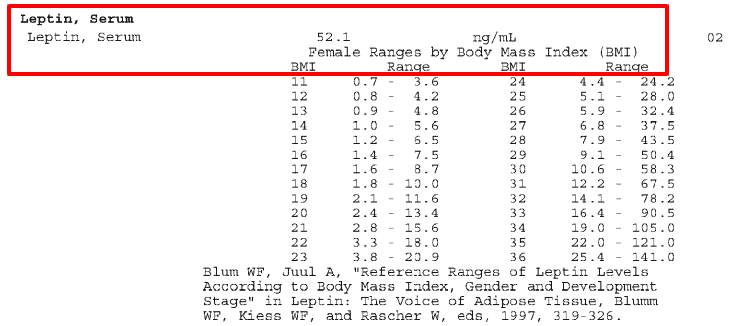
In addition to her leptin level of 52.1 ng/ml, this particular patient was also experiencing weight loss resistance, a cold body temperature, hair loss, disordered appetite signals, and other symptoms of hypothyroidism.
This would be a very classic example of someone with leptin resistance which is quite obvious with some simple lab testing.
What some patients get confused about is the scaling of leptin with BMI.
They will see that their leptin is “normal” for their set BMI and think everything is okay.
Don’t fall for this.
All this scaling value suggests is that as BMI increases, their leptin level increases as well.
While this is true, it’s fairly meaningless as far as a “normal” value is concerned.
You absolutely don’t want to compare your own leptin level to someone with the same BMI as you because that just indicates that you both have the same problem: obesity.
Instead of looking at the scaling value of leptin, look to see if your leptin level is elevated.
If it is, and you have any of the symptoms we are about to discuss, you have enough information to say that you are leptin-resistant.
Why Diagnosing Leptin Resistance Matters
Leptin’s primary job is to regulate your body weight (2) and metabolism (3).
And it does this job by interacting directly with thyroid hormone, another major player in metabolism regulation (4).
These two systems play together to help your brain set your appetite, help your brain regulate and set your metabolism, and help your brain communicate with your fat cells.
When done correctly, these two systems help you maintain a normal and healthy body weight.

When either becomes dysregulated (either your thyroid or leptin levels), it becomes very difficult to manage your weight.
And this is precisely why the presence of leptin resistance matters.
It provides you with an explanation for why you may (or may not) be able to lose weight.
And understanding its presence can change things because it means you can more specifically target therapies to treat it.
Signs and Symptoms You Are Resistant To The Hormone Leptin
One of the best ways to evaluate for the presence of leptin resistance is by taking a look at how you are feeling.
You might be tempted to think that it’s easier to just get a lab test to confirm the presence of leptin resistance but here’s where you’d be wrong.
While the test is relatively easy to obtain once you know what to test for, getting your doctor to order it may be difficult.
But evaluating your leptin level may not even be necessary because you can glean a lot from your symptoms.
Symptoms that may indicate you have leptin resistance include:
- The inability to lose weight even with calorie restriction and extreme exercise (if you are eating fewer than 1,000 calories per day and NOT losing weight then that is an indicator you may have leptin resistance)
- Extreme cravings for food even if you’ve recently eaten (6)
- A slower than normal or damaged metabolism (7) (you are burning fewer calories than normal)
- Persistent weight gain despite attempts at weight loss
- Lower than normal body temperature
- Lower than normal resting heart rate
- Presence of other hormone imbalances (including hypothyroidism, estrogen dominance, low progesterone, low testosterone, or high cortisol)
Is a High Leptin Good?
You may hear in various places on the internet that having a high leptin is actually good, not bad.
But how can this be if I just told you that a high leptin is the standard with which we use to diagnose leptin resistance?
This very topic is the source of a lot of confusion among people who are trying to evaluate their leptin status.
While it is somewhat nuanced, it’s not very complicated:
As it stands, leptin is not a bad hormone, as long as it remains functional.
What trips people up is the difference between an elevated leptin and the state of leptin resistance.
In the healthy state, once you start to gain weight, your body will increase leptin production which acts to help you get back to your old weight.
This is good and what is supposed to happen.
But if your leptin stays elevated for long enough, eventually you will become resistant to the hormone.
This is bad and not what is supposed to happen.
But, initially, you do want to see that rise in leptin and this is why some people will talk about increasing leptin for fat loss.
Assuming you are sensitive to it, increasing your leptin will be helpful.
But if you are resistant to it, increasing your leptin will only make your resistance worse.
Both statements are true, it just depends on where you are at in your disease progression as to whether or not increasing leptin will be helpful or harmful.
Severity and Treatment of Leptin Resistance
Testing your leptin level is very important because the absolute level of leptin in your body in the fasted state can help you determine just how resistant you are.
Imagine leptin resistance on a spectrum or a continuum.
On one side you have a very minor, relatively easy-to-treat leptin resistance which only causes a minor difficulty in weight loss, and one which responds to simple lifestyle changes such as diet, supplements, and exercise (8).
People who have minor leptin resistance may only have a fasted serum leptin level in the 14-20 ng/ml range.
On the other side, you have a very difficult-to-treat version of leptin resistance which only responds to therapies that include medications, hormones, supplements, and dietary changes.
People with moderate to high leptin resistance often have a fasted leptin level greater than 40 ng/ml (sometimes even much higher than this).
Generally, the higher your leptin level is the more difficult it will be for you to both treat the condition and for you to lose weight.
It also helps give you information about what kind of therapies you are likely to need to treat your condition.
One of the biggest problems with leptin resistance is that it is not always appreciated in the conventional medical community.
Doctors such as your endocrinologist or primary care physician are probably not aware of leptin resistance or how to treat it.
As you become more leptin-resistant, the therapies that you need start to require medications (9) and hormones which can be difficult to get unless you have a doctor working with you.
Treatments that fit into this category include GLP-1 agonists, T3 thyroid hormone, dietary changes, and supplements.
If you have severe leptin resistance you will most likely also have to look at other hormone imbalances such as low T3 syndrome and hypothyroidism.
Conclusion
Leptin resistance is actually an easy condition to diagnose and it can be diagnosed with simple blood tests which your doctor can order.
This test should almost always be covered by insurance and any doctor can order it.
To get actionable results, make sure that you get tested in the fasted state.
When you get tested, I also recommend that you check other hormones such as your thyroid system, your cortisol, and your sex hormones.
The combination of your serum leptin level and your symptoms can help you determine just how resistant you are.
The more resistant you find yourself, the more aggressive therapies you may need.
Now I want to hear from you:
Do you know or suspect that you have leptin resistance?
What is your fasting leptin level?
What therapies have you tried to help normalize it?
What has worked for you? What hasn’t?
Leave your questions or comments below!
Scientific References
#1. https://www.ncbi.nlm.nih.gov/pmc/articles/PMC3281561/
#2. https://www.ncbi.nlm.nih.gov/pmc/articles/PMC2430504/
#3. https://www.ncbi.nlm.nih.gov/pmc/articles/PMC4267898/
#4. https://www.ncbi.nlm.nih.gov/pmc/articles/PMC377492/
#5. https://www.ncbi.nlm.nih.gov/pmc/articles/PMC4069066/
#6. https://www.ncbi.nlm.nih.gov/pmc/articles/PMC4207200/
#7. https://www.ncbi.nlm.nih.gov/pmc/articles/PMC5097076/
#8. https://www.ncbi.nlm.nih.gov/pubmed/23669042
#9. https://www.ncbi.nlm.nih.gov/pmc/articles/PMC4424381/
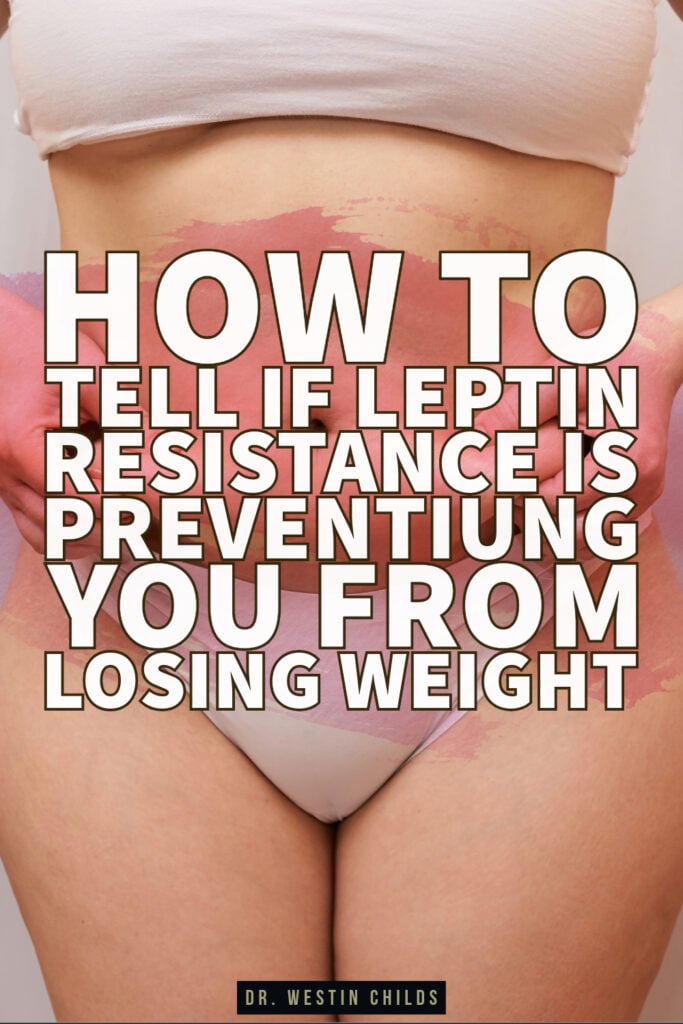


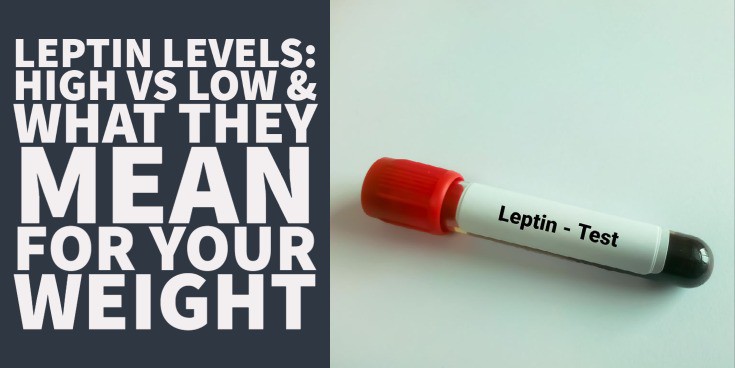

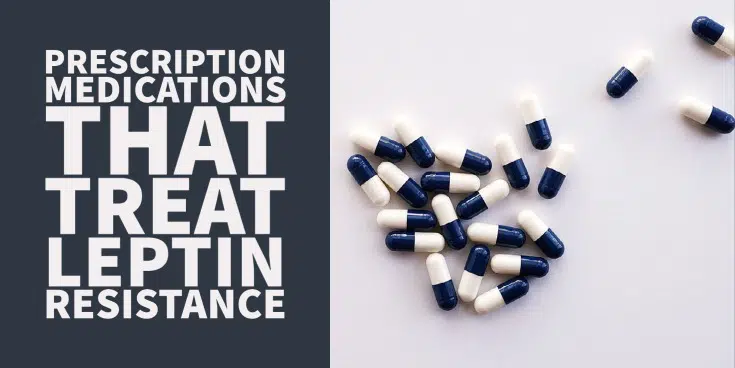

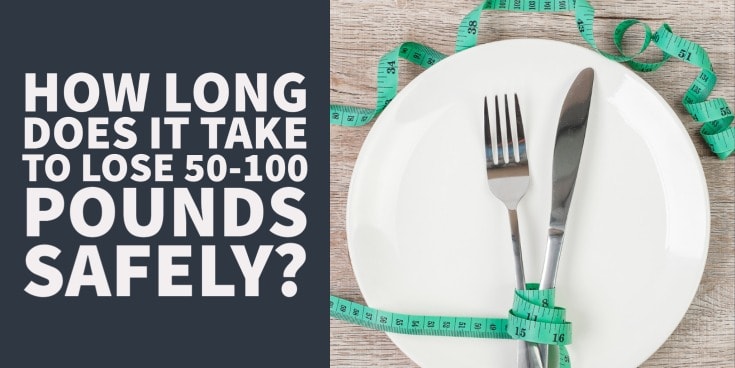

I have the majority of the symptoms of leptin resistance that you mention above – with the exception of the hormones. I have been on nature-throid, bhrt for progesterone, testosterone and bi-est. The latest lab results (last month) are:
serum testosterone: 45ng/dl range: 3-41
free T4: 1.22 ng/dl range: .82 – 1.77
free T3: 4.3 pg/mL range: 2.0 – 4.4
progesterone: .2 ng/mL
estradiaol: 53.2 pg/mL
A1c: 5.4%
I have asked to have my reverse T3 tested as well as fasting insulin, leptin and cortisol, but always get denied. His theory is that fasting insulin means nothing in terms of weight loss.
I am always tired and have no energy. My fasting glucose is consistently in the high 90’s (always between 95-99).
He wants to get my testosterone up around the 200 range as he said that will help with weight loss. I am 59 and post-menopausal. I am afraid of the side effects of such high testosterone.
At my last appointment, he said it is up to me to figure out why I cannot lose weight as my hormones are all ok. I feel as though I am being treated as a number on a piece of paper.
I am now considering ordering the lab tests from one of the on-line sites and treat myself. There aren’t any other integrative/functional doctors around where I live.
Any insight would be appreciated.
Hi Mary,
It sounds like you probably need to make sure that you test your serum leptin to see if it is a problem and perhaps seek a second opinion from a physician more willing to work with you. You can find resources on how to do that here: https://www.restartmed.com/thyroid-doctor/
Hi Dr. Childs- I am long term hypothyroid (over 20 years) and have just recently gotten a leptin test after watching some videos about leptin resistance. It has always been very difficult to lose weight and move from my 200 pound setpoint. In 2015, my endocrinologist gave me Saxenda (GLP-1 agonist) and I lost 30 pounds, but it was because I didn’t eat. The medicine made me sick to my stomach. Once I stopped taking it, the weight came back again even though I eat plant based and fairly healthfully. Anyway, my fasted (12 hour) leptin result was 24.9 and I am 41 with a BMI of 33. My PCP told me the result is normal, but based on what I’ve learned from you, that is elevated. Right now, I am trying a low carb vegan diet with higher fat and moderate carb to see if that will work. Any thoughts? I know you aren’t treating but your blog asked for feedback so here it is. I’m interested to see what you think. Also- congrats on the BYU graduation! I’m a graduate from BYU-Idaho!!
Hi Shannan,
BYU is the best 🙂
And yes, in order for Saxenda to work it must be used correctly. The way that I recommend dosing for Saxenda is much different than the way that conventional doctors recommend using it. In many cases, at least by the time people get to me, traditional diets and lifestyle changes are not sufficient to correct leptin resistance. So it could be that your diet is great for your body, but not necessarily sufficient by itself to correct your leptin resistance.
Dr. Childs,
Please tell me how you dose Saxenda!
The dosing schedule shows to titrate up 0.6mg/week.
Is this what you recommend? I’ve also heard people stay at 0.6mg until they start having hunger pangs again, then they go up to 1.2, and so on.
I’d like to know your recommendations.
Thank you.
My thyroid gland has been killed with radioactive treatment iodine or I should say nuclear medicine. At this point what do I need to do? How to take care of myself since my thyroid gland isn’t there. I do know that I am gaining weight, suffering from hair loss, and cold body temperature. Help!
Hi there,
I am hypothyroid and have adrenal fatigue for several years now after a copper iud I believe. I am Hoping to get on T3 only very soon as I tried armour last year and was severely underdosed and my FT3 was converting to and raising the RT3 and I became more hypo and gained more weight and got colder and lower Heart rate in effect. I begged that doctor to test my leptin and it came
Back super low—at 3.5. I have all the symptoms
Of leptin resistance and even teach fitness classes and exercise a lot and still experienced a rapid weight gain about 20 mos ago and its continuing today with the complete inability to lose weight even on whole 30 and AIP! What does a low leptin level mean? She had no clue and I can’t find any info on the web about it?
Hi Katie,
A low leptin level will give you the same condition and symptoms as leptin resistance. It can be caused by hypothalamic/pituitary issues.
Leptin resistance is a lack of sensitivity in the body to leptin so it’s as if your brain believes that leptin is low. So you can see that low leptin levels create the same type of scenario only the leptin level is low instead of high as in leptin resistance.
I am low-leptin also (3.5), also with the same symptoms as leptin-resistance. So this response makes sense.
Is the treatment the same?
Dr. Childs,
Can you comment on this? I also have low leptin after years of bulimia. I’ve tried to address metabolic damage in myriad ways but my weight continues to increase. I’d also like to know how you’d consider (hypothetically, I understand I’m not your patient nor would take suggestions as medical advice) treating this (hypothalamic, pituitary dysfunction, low leptin). Would you treat it the same as leptin resistance?
Thanks so much in advance as this is really taking a toll.
Josh
Hi Josh,
I typically do treat those with low leptin the same as those with leptin resistance. The results are variable, though.
Seeking info re leptin and lipodystrophy: findings, labs and treatment. Any assistance greatly appreciated.
When I first tested my Leptin in September 2018, it was 67. Terrifying! I followed the “Five Rules” laid out in the book “Mastering Leptin” and I just tested again in April 2019 and my Leptin was 34. Huge improvement. I have lost 20 lbs from Sept to April.
Here are the guidelines I’ve been following:
1. Never eat after dinner. Leave at least 3 hrs between dinner and bed.
2. Eat 3 meals a day…. NO SNACKING! <– hardest rule for me!
3. Don't eat large meals. Eat slowly and stop eating slightly before full.
4. Eat a high protein breakfast.
5. Eat low carb.
However, its been slow going for me losing weight, so I'm on Saxenda now… just starting out. I really hope it helps. But until I could convince my doctor to prescribe it, and until I could afford it, the five rules helped a lot.
My leptin level is 77. What do I do first? What does that mean?
Hi Dr. Childs,
I just had my fasting lab work done and the results are:
Serum Leptin 40.1
Reverse T3 29.1 (Reference range 9.2-24.1 ng/dL)
Free T3 3.1 (Reference range 2.0-4.4 pg/mL)
Free T4 1.27 (Reference range .82-1.77 ng/dL)
Insulin 8.2 (Reference range 2.6-24.9 uIU/mL)
Serum Testosterone 138 (Reference range 3-41 ng/dL)
Testosterone %F&W 3.4 (Reference range 3-18%)
Testosterone F&W 4.7 (Reference range 0.0 – 9.5 ng/dL)
Progesterone .3
Estradiol 9.6
Currently, I am taking 400mg progesterone per night, 2mg of bi-est 60:40 per day, 1 97.5mg Nature-throid per day and 1 click (1/4 gram) of testosterone HRT 3% cream per day.
I am 58 years old and post-menopausal for 9 years. I am concerned about the high leptin and rT3 levels. I am unable to lose any weight no matter what I do. With the exception of the increased appetite I have all of the other symptoms that are listed in the article. I do have cravings – especially for sweets/carbs.
My doctor has left it up to me to figure this out as he will not prescribe any medication (outside of bio-identical hormones and Naturethroid). I had to pay for the rT3 and Leptin tests myself as he informed me that they were not needed.
So, I am wondering if I should start taking higher doses of Berberine, ALA, etc? Or should I start with Oralvisc?
I’m 40 pounds overweight (all within the last 3 years) and am at a loss where I should start (and I know now that I need to find another doctor). I know that you cannot provide medical information online, but if you could provide me with any information/starting point, I would appreciate it. thank you!
Dr Childs,
I went to a lab to have the serum leptin test and they ask me if it came under another name. They could not find it so I was unable to have the draw. Can you help?
-Beth
Hi Beth,
The lab test is called serum leptin so it should come up with that query. If they are a small lab then they might not run it.
Hi Dr. Childs,
What are the reference ranges for a normal and healthy Leptin Serum? Is it bad if someone has a very low Leptin Serum? Mine was 1.1 at 21.4% bodyfat. I just had it tested again and it was 6.1 and I’m probably 22% body fat now. I understand how a high Leptin level can be a negative thing if a person is resistant but I’m so confused about what it means if you have a very low Leptin level. It almost sounds like your metabolism would be super slow and the lack of Leptin would trigger your brain to tell you you’re starving! Is it possible that if you’re genetically born to have a low Leptin Serum level (ex: 1.1) than the body would think a 6.1 is now high and therefore it’d signal the brain to think you’re full and speed up the metabolism and use more calorie rather than do the opposite?
Hi Michelle,
Having a low (or zero) leptin creates the same environment as a high leptin with leptin resistance. There are some conditions which result in very low leptin but it is less common than leptin resistance (high leptin). So, yes, you would see the same symptoms with a very low leptin level as you would with a high leptin level.
I had genetic testing done and my LEP-r was broken and lab levels are very low… so what is the treatment for low leptin due to genetics and how do you reverse?
Hello,
Did you ever find out the treatment for low leptin? I have the same issue, it seems Dr Westin tells people that it will have the same effects as high leptin but does not offer any treatment advice. Any thoughts?
I am in this same boat. Low leptin levels but same symptoms. Would love any advice!
I’d really love to know as well. There’s very little out there on tx for low leptin.
Reading this article I feel a tiny bit of hope, I have all of the symptoms above. I’ve been naturally quite thin my whole life, but one day, 3 years ago it was like a switch flipped – my hair rapidly thinned out, and I gained close to 60lbs in a year despite doing very hard manual labour 3-4 days a week.
I always feel like there is no girl in my body, regardless of whether or not I have eaten. It just feels like the nutrition doesn’t “reach” my cells. I never used to feel like this, I used to have energy and lived to eat – now I’m scared of eating despite being hungry or “low” all the time.
NP doc tested my thyroid and put ne in lie does dessicated with no change in symptoms.
Small breakthrough was recent diagnosis of h pylori, which went undiagnosed for approx 3 years of repeat doctors appointments/ worsening of symptoms.
Do long term gut problems impact/influence leptin levels and or resistance?
I’m so sick of being told “calories in, calories out” by old white men when there is clearly something wrong.
Hi M,
Well, I’m a young(ish) white man telling you that there’s definitely something going on more than just calories! In regards to your other question, I don’t typically see a direct connection between gut health and leptin/insulin levels outside of its regular influence on inflammation which is obviously at the root of many conditions including hormone resistance syndromes. You typically don’t see massive inflammation sufficient to cause those disorders on their own but it’s plausible that it may make them worse if they already existed.
Hi Dr Childs, what do you think of replacing calories with coconut oil to reduce weight/leptin resistance?
I am over 30% body fat, BMI 27, gained a large amount of weight very quickly and tried on and off to eat normally and cut back when it went up to no avail. I have lost some but my leptin is 9. What is the treatment for this starvation response? I have 45 pounds to lose to get back to my pre-gain weight and it doesn’t seem impossible. Also have mid range free t3, borderline high rt3, thyroid going autoimmune with tpo 8, high estrogen (likely from high body fat), low progesterone, but normal insulin at 13.6 and normal blood sugar at 88. All fasted for 12 hours before testing. Exercise has zero impact on weight or ability to gain muscle. Any advice please? My body thinks it is starving at an obese body fat and has eaten its own muscle mass when I cut back on calories.
My fasting leptin levels are 100+ which I think is extremely high (or?). My BMI is 38. I suffer from cold temp, hair loss and extreme hunger and cravings, even though all my lab results are normal, except the leptin. I can lose weight, however, after dropping about 10 kg’s, my body and brain starts fighting me with unbearable cravings and soon after I gain it all back. This has happened to me 3x within the last 2 years. I also struggle with lethargy, fatigue and doesn’t have the energy to exercise. I also very easily have tetany type of muscle spasms. Now, I quit sugar and flour completely and started working on losing weight again. Any advice on how I can keep it going beyond the critical 10 kg’s would be greatly appreciated.
Hi,
Thanks for the article. After years of trying everything to lose weight (intermittent fasting, cardio and weight exercise classes, acupuncture, naturopath) I asked for a leptin test. It was 80! I am also insulin resistant, on HRT and monitoring my thyroid.
I am now on Saxenda and slowly losing pounds but seem to have plateaued.
Should I have another leptin test done? Can you think of anything else I should try? I would also like to know what set this all off…..as I was a ‘normal’ weight until my mid 40’s.
Hi Dr. Child’s, I had my lepton levels checked, and it is 43, my bmi is 30. Every time I try to lose weight, I actually gained weight. My doctor has issued in order for Waygovy. After reading the reviews, I see that it works because you have no appetite. What will happen after I come off of that or is that gonna be a lifetime thing? I’ve read several others have gained all of their weight back plus some.
Could you please let us know what happens after people come off of the leptin reducing drugs.
At this time I can’t get a prescription of the Waygovi, because my insurance does not cover it and pharmacies do not have it. Is there any other medicines without the strong side effects that you work with to help lower or balance leptin levels?
I do not need personal medical advice as I know that you were unable to give that over the Internet, but just some roundabout questions of your experiences in weight loss.
Thanks for the article!
I asked my doc to run a serum leptin test, she ran a quantitative leptin…are the result ranges the same? Thanks in advance.
Hi Cathy,
I’m not familiar with quantitative leptin, which lab ran the test?